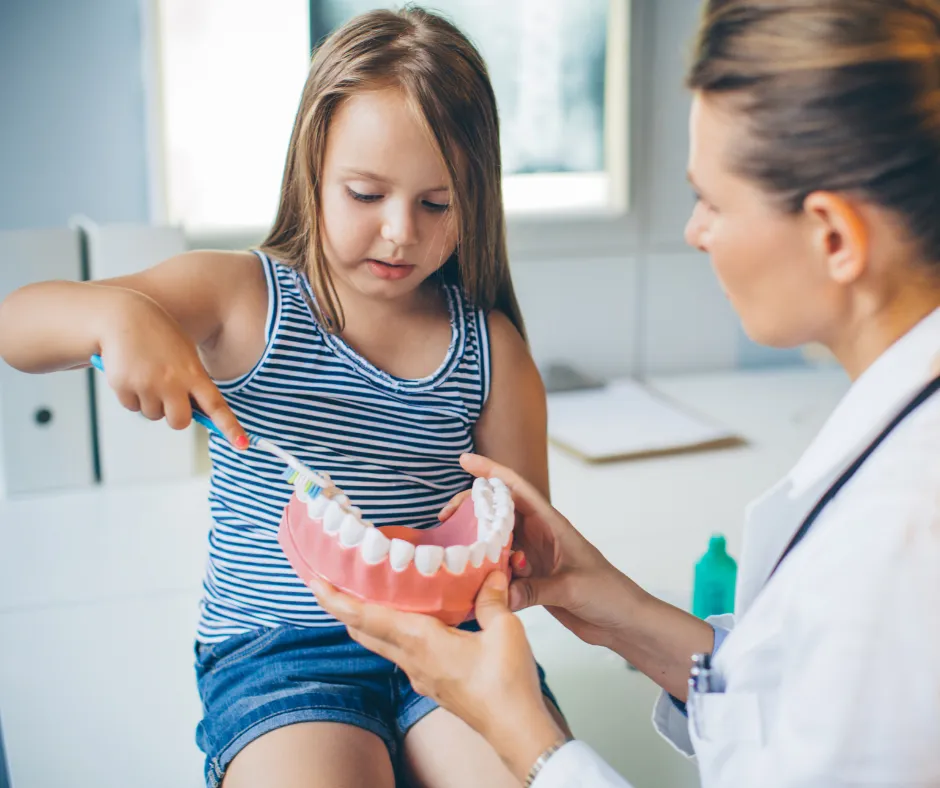Tooth Care Tips for Tots
December 9th, 2020
Baby teeth are just as prone to cavities as adult teeth, so establishing an effective oral health routine from an early age is key. Teaching children to look after their baby teeth will help lay the foundations for a healthy adult mouth.
Dr Elaine Shore, a paediatric dentist at our Cabinteely practice in Dublin, answers some frequently asked questions about toddlers’ dental health.
Q. When should I start brushing my child’s teeth?
A. Toothbrushing should start as soon as the first baby tooth appears in the mouth. The first teeth begin to erupt at around 6 months, but each child is different so it may be a little earlier or later in some cases.
Q. How can I encourage toothbrushing for my child?
A. The best way to encourage toothbrushing is to make it part of their normal routine from when the first tooth appears in their mouth. Toddlers are too young to brush their teeth by themselves. We recommend that parents brush their child’s teeth for them at bedtime or bath time, and at one other time during the day. The easiest and safest way for you to do this effectively is for the child to be lying down in a comfortable place while you brush their teeth.
Consultant paediatric dentist Dr Kirsten FitzGerald from Children’s Health Ireland at Crumlin, has developed a very helpful video demonstrating this technique.
Q. What type of toothpaste should I use to brush my toddler’s teeth?
A. For children aged 0-2 years, the use of toothpaste depends on how much your child is at risk of tooth decay.
If your child is at low risk of dental decay, there is no need to use fluoride toothpaste until age 2 years. Instead, just use the toothbrush with some plain tap water on it.
If your child already has decay in their teeth under the age of 2, or is at high risk of developing decay before age 2, you may be advised by your dentist to use a small smear of fluoride toothpaste on the toothbrush (roughly the same size as a grain of rice). The fluoride in toothpaste helps to strengthen and support teeth so they can recover from the acid attacks caused by foods and drinks, reducing the risk of dental decay.
From age 2 years, children should be using a smear of fluoride toothpaste twice a day. From age 3 onwards, a small pea-sized amount of fluoride toothpaste may be used on the toothbrush, twice daily.
Q. How long should brushing last?
A. Teeth should be brushed twice a day for two minutes. There are several songs and videos available online to help with timing this, which may also help to make it more fun. Always make sure your child spits out after brushing to avoid swallowing toothpaste, with no rinsing afterwards for at least 20 minutes. This is to allow the fluoride toothpaste to work on strengthening the teeth.
Q. When can my child brush without supervision?
A. We recommend that parents help with toothbrushing until the child has demonstrated good manual dexterity for independent tasks such as tying shoelaces. This varies from child to child. In general, children must have parental help with toothbrushing throughout the toddler years.
Q. When should a child start visiting the dentist?
A. Ideally, a “dental home” should be established by the age of 1. This means bringing your child to a dentist for check-ups from when their first teeth erupt. Getting them used to the dentist early means the child is introduced to the dental environment at a young age in a non-urgent setting, so it is a more positive experience. It is also an opportunity for dentists to provide support and advice for families on how to generate healthy dental habits at home to prevent decay from the very start.
Q. How can I prepare my toddler for a dental visit?
A. We recommend that you explain in positive, child-friendly language that the dentist will count your child’s teeth and check that they are healthy. There are lots of child-friendly books and songs about toothbrushing and visiting the dentist which may be useful for very young children to help them understand what to expect.
Q. What is a paediatric dentist, and why might my child need to see one?
A. A paediatric dentist specialises in providing dental care for children. Paediatric dentists undergo three years of full-time specialist training, in addition to their general dentistry training, so they have additional expertise in providing dental care for children in a way that is safe, effective, and acceptable to the child. This may involve using techniques like inhalation sedation (“happy air”) or general anaesthesia, if needed. The focus of paediatric dentistry is helping your child to have a positive dental experience and build lifelong healthy dental habits, so that they need minimal dentistry in future.
To book an appointment at your nearest Dental Care Ireland practice, contact us here

